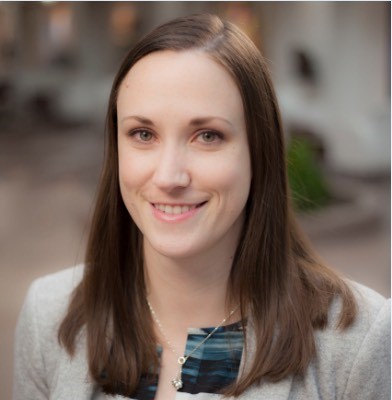An interview with Heather VanSeggelen, PhD
Current Scientific Advisor at GSK

Dr. Heather VanSegglen completed her PhD in Dr. Jonathan Bramson’s lab, where I worked on developing novel immunotherapies for cancer, specifically focusing on engineering T cells using synthetic receptors called “Chimeric Antigen Receptors” or CARs.
In her role as a Scientific Advisor at GSK, Heather’s favourite thing is that no two days are ever really the same. In Medical Affairs, they sit at the centre of nearly all other parts of the business – marketing, regulatory, clinical, sales, reimbursement, government affairs, communications, and more, and as a result are involved in a wide variety of different projects.
I completed my PhD in Dr. Jonathan Bramson’s lab, where I worked on developing novel immunotherapies for cancer, specifically focusing on engineering T cells using synthetic receptors called “Chimeric Antigen Receptors” or CARs. This was a fascinating project, as this was a “hot topic” in the immunotherapy field, and really turned into a new direction for the lab as a result. I had the pleasure of kicking off our work in this area, and while painstaking at times, it was worth it to identify new areas of research. While I was at MIRC, I had the pleasure of working across many of the different labs, collaborating on a variety of research projects, the Perey Symposium, and organizing more social activities like the annual holiday potluck. Overall the time I spent at MIRC was an important part of my life that I wouldn’t trade for anything.
In my role as a Scientific Advisor at GSK, my favourite thing is that no two days are ever really the same. In Medical Affairs, we sit at the centre of nearly all other parts of the business – marketing, regulatory, clinical, sales, reimbursement, government affairs, communications, and more, and as a result are involved in a wide variety of different projects. I have really enjoyed being the “scientific expert” on different diseases and products, and playing a part of a multitude of different projects as a result. This has varied from everything from managing external investigator-initiated research studies, presenting scientific data at conferences or to key stakeholders (inside and outside of the company), to supporting the sales force, and even participating in promotional material development. I also have really enjoyed the international collaborations, where we have close ties to our region as well as our global colleagues – even when it means teleconferences at strange hours due to time zone differences!
While I am still fascinated with research and love the concept of experimental research, I realized part way through my PhD two key things: (a) the academic career route was not something I was particularly interested in (grant writing was not something that appealed to me), and (b) I was ready to move away from the lab bench. I have a strong passion for scientific communication and still wanted to be close to the research, without having to design or conduct the experiments myself. This led me to explore the area of medical affairs, where in general in the role is focused on both scientific communication as well as gathering information from the external community to inform business activities. I can honestly say this was one of the best “lightbulb” moments for me, as the role is a perfect fit for what I was looking for.
My time at MIRC prepared me for my career in a number of different ways. Firstly, it allowed me to further my expertise and passion for immunology. While not essential for the role, I have found my strong background as an immunologist has really helped me advance my career even within my role, and gave me a great start in a new industry. Secondly, my time at MIRC helped hone my critical thinking skills which are essential for my career. In addition, I had a great deal of opportunity while at MIRC to develop my communication skills, from poster and oral presentations (both internally and at local, national and international conferences), to the 3-Minute Thesis competition. These opportunities were valuable both in helping me identify what I wanted to do with my career, as well as prepare me to be successful in the industry.
This is the hardest question here! I’m not sure I can pick just one from some of the great teamwork memories of big harvest days, through some great conferences with the lab, and the fun team-building activities we did over the years (lab camping anyone?). The lab and the research centre really felt like an extended family to me, and all of the experiences I had (the good and the bad) helped shape who I am today.
Be proactive in your career planning. You’re the only one who is going to drive your career choices. Determine what skills you think you will need for the career you want after life as a grad student, and work to build those skills by taking on any opportunities that come your way. It’s not just about the very minute details of your graduate experience (IE PCR and flow cytometry are not relevant skills for all career fields), but the soft skills you’ve also gained along the way. Build up your experience in these areas as they’re transferrable no matter what you want to pursue. Even if the academic career path is the way you want to go, strong communication skills will only help you in both the interview process to find a job, as well as grant writing to support your lab. Finally, don’t underestimate your network. Build this while you’re a trainee, and actively reach out to talk to people about their careers to help guide you in where you want to go. You’d be surprised how far your connections will get you!
